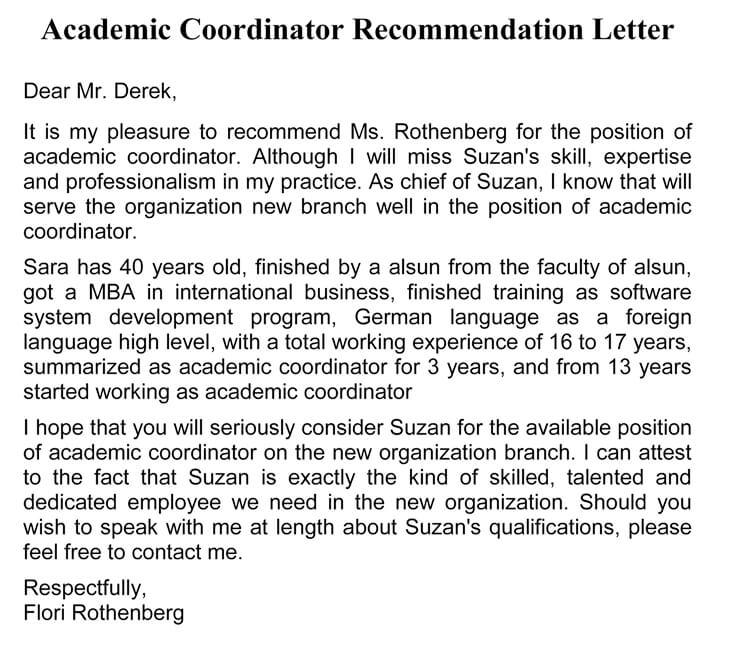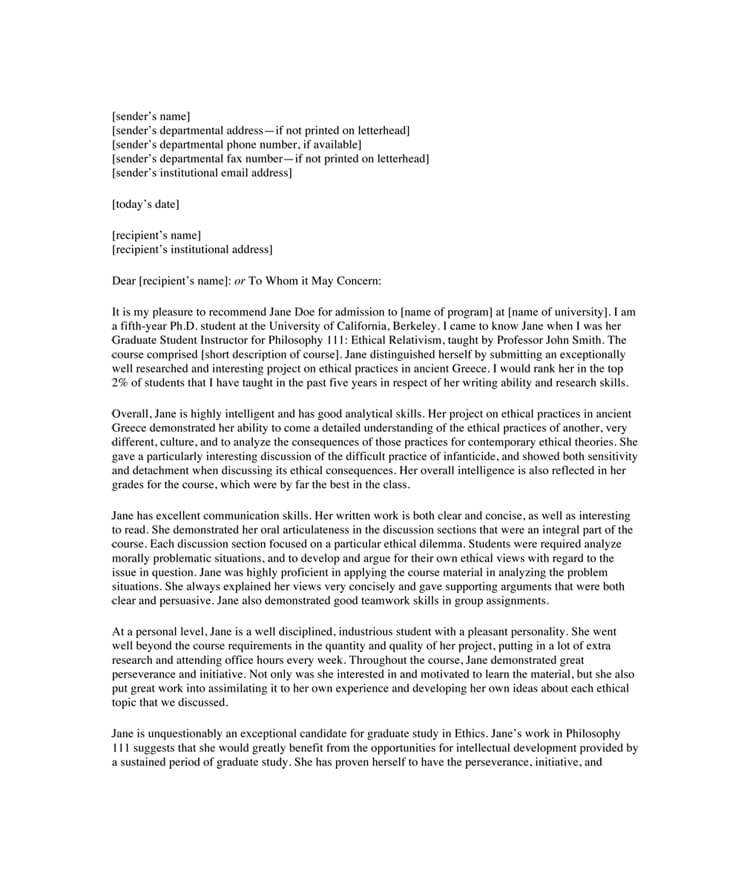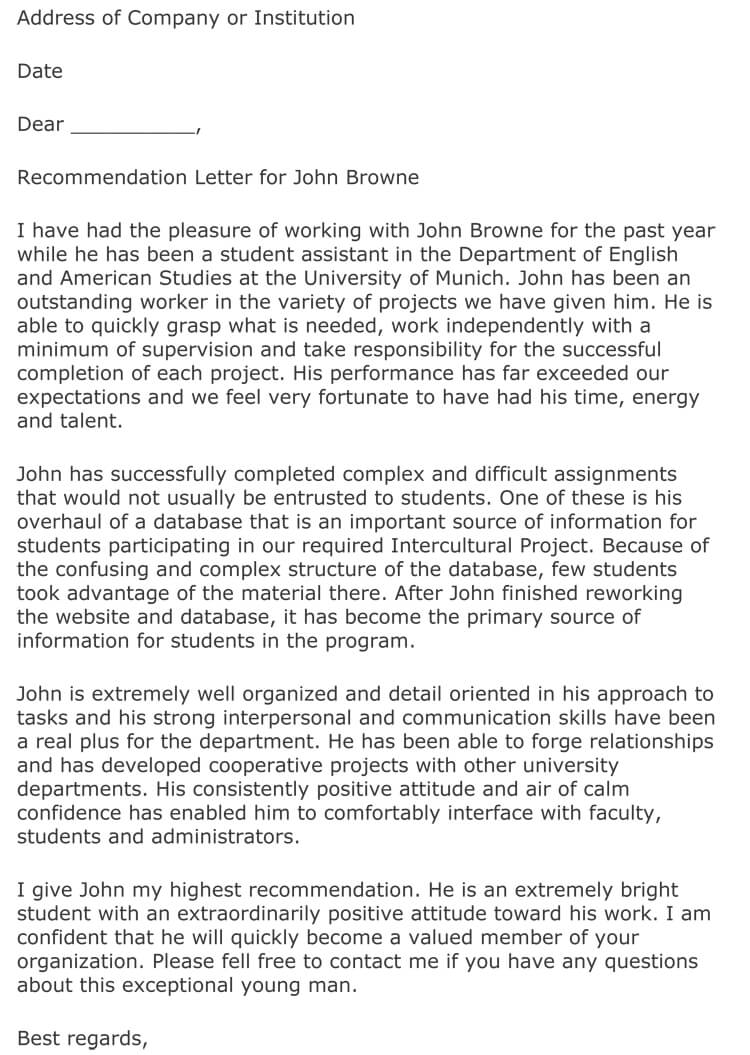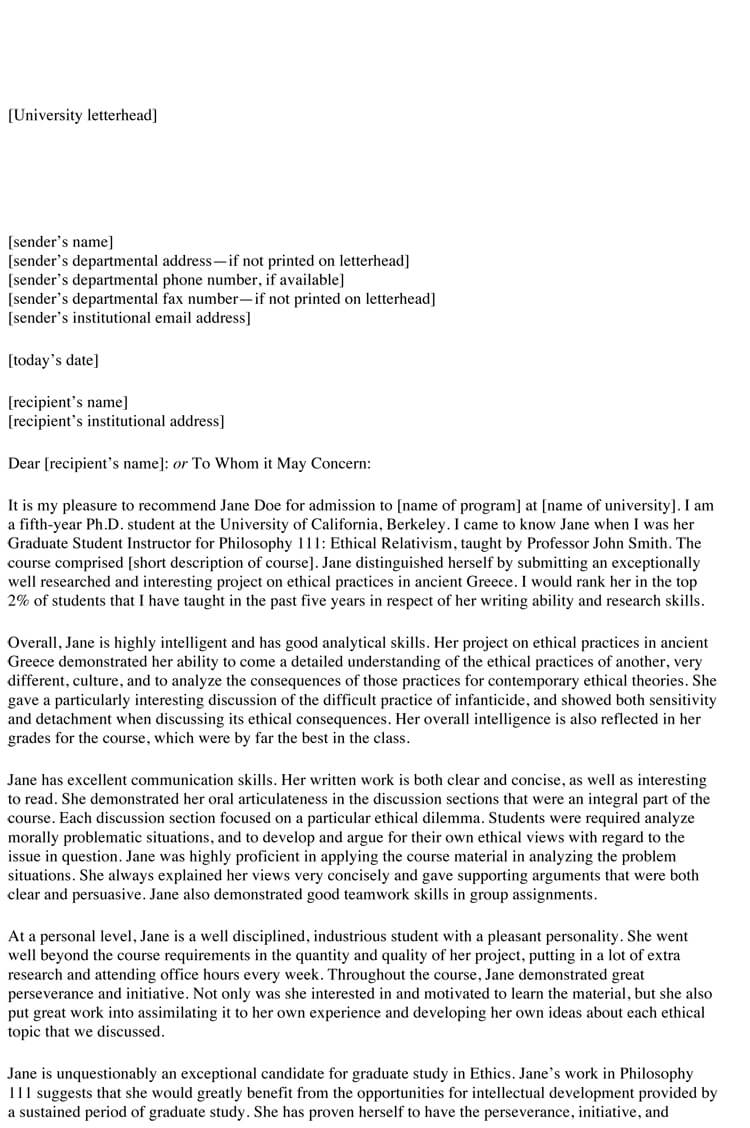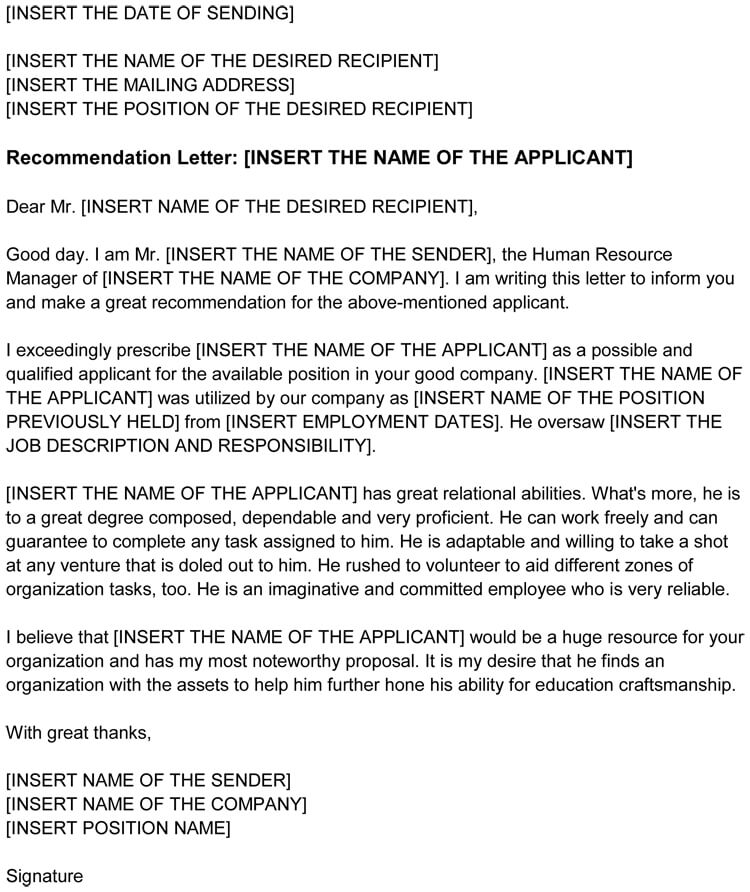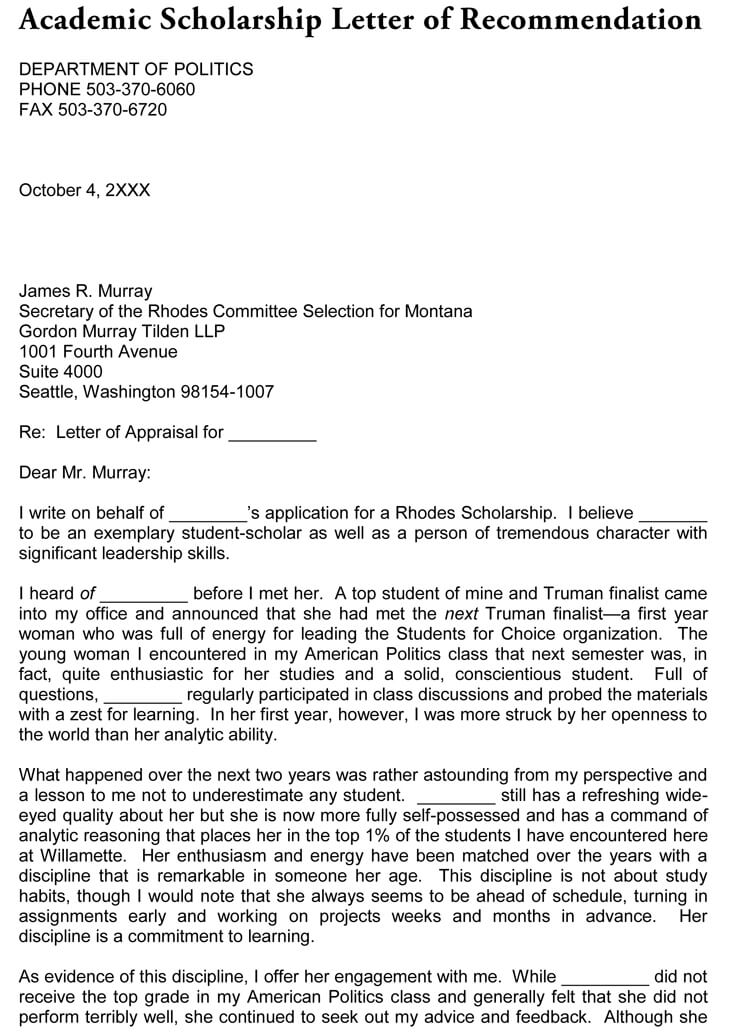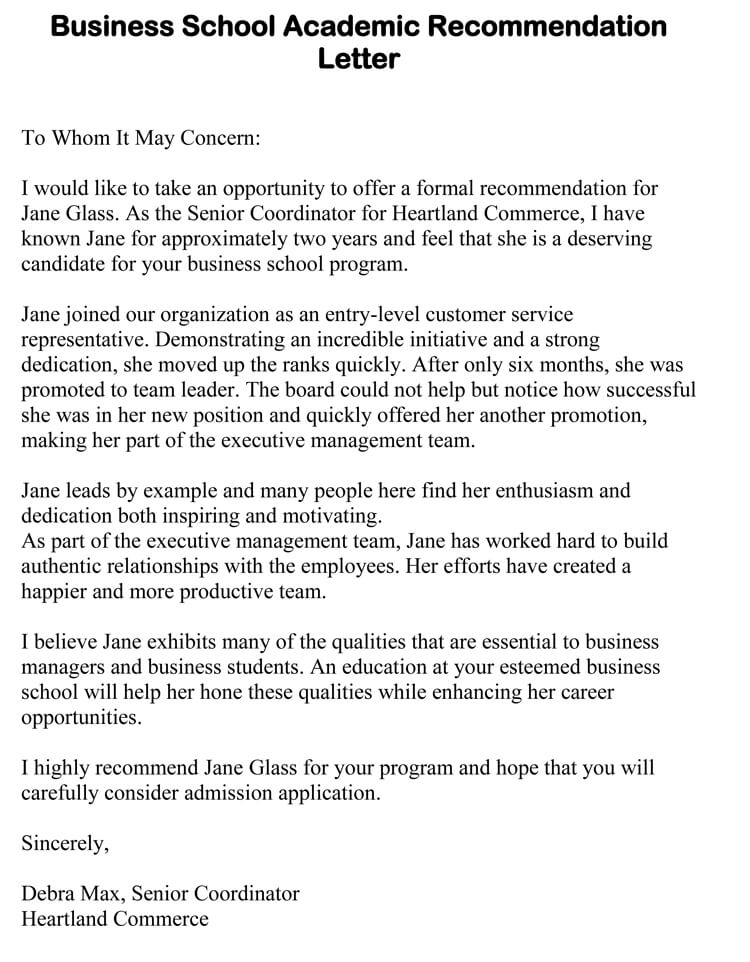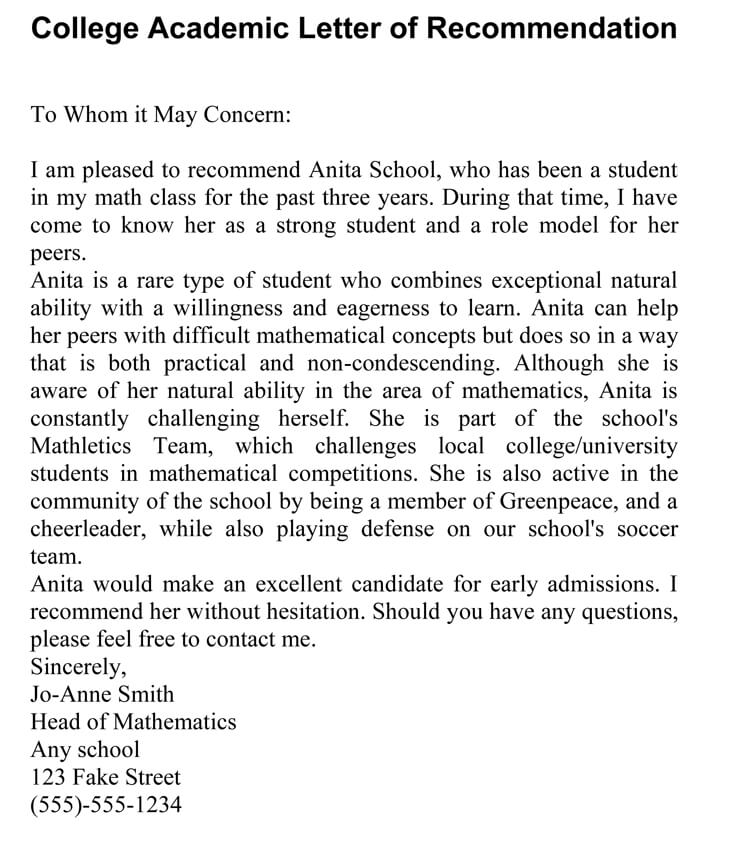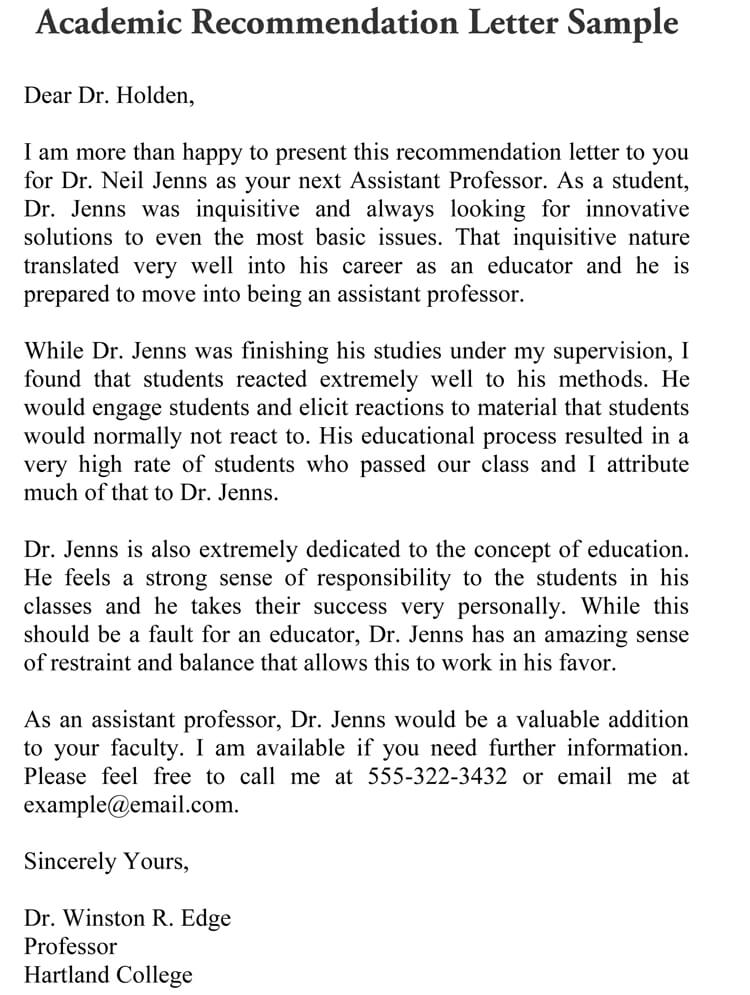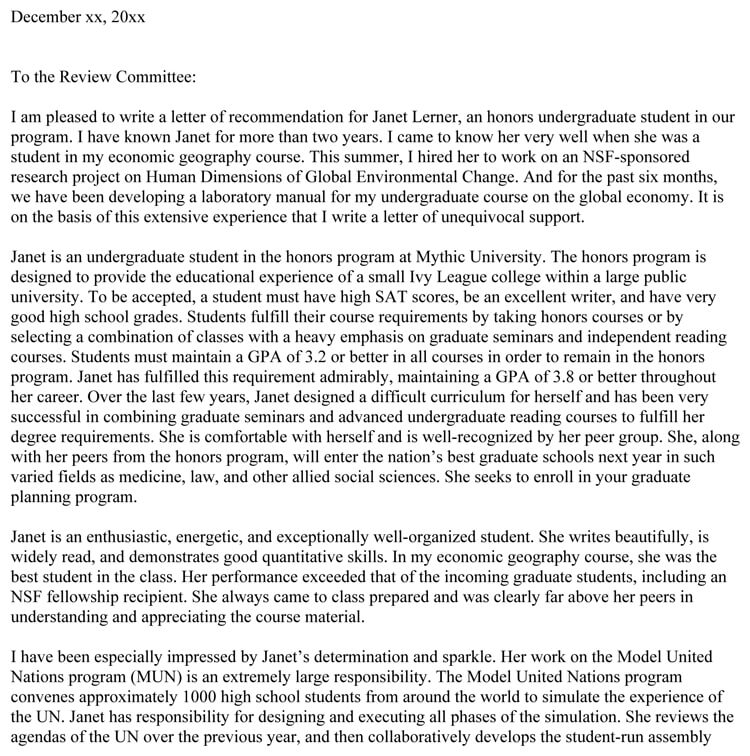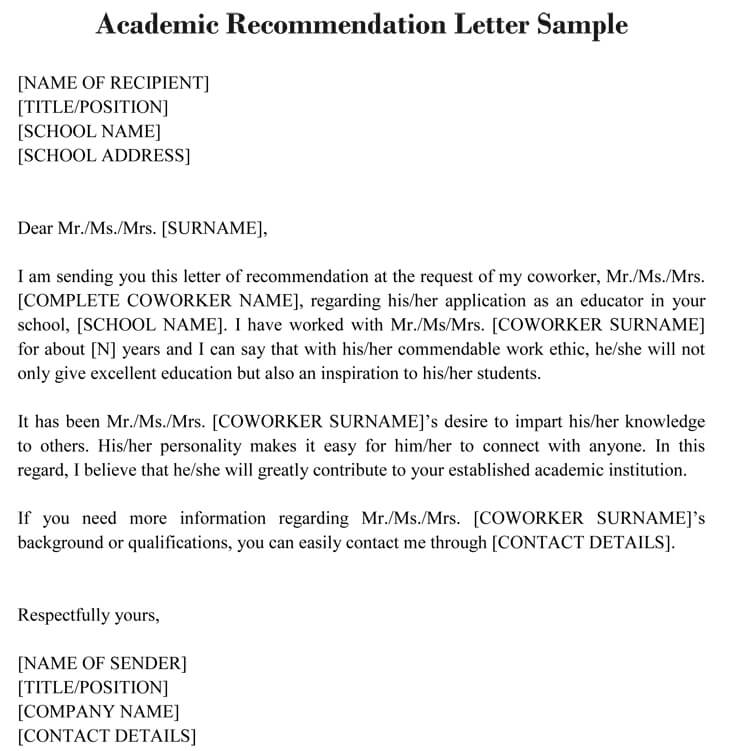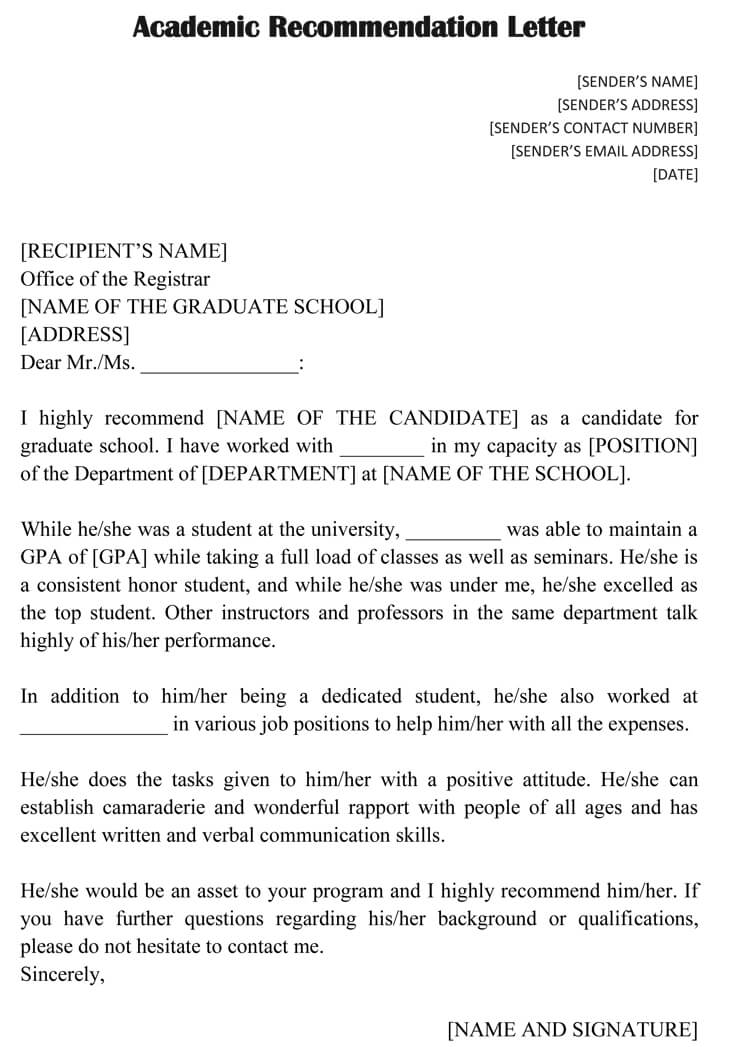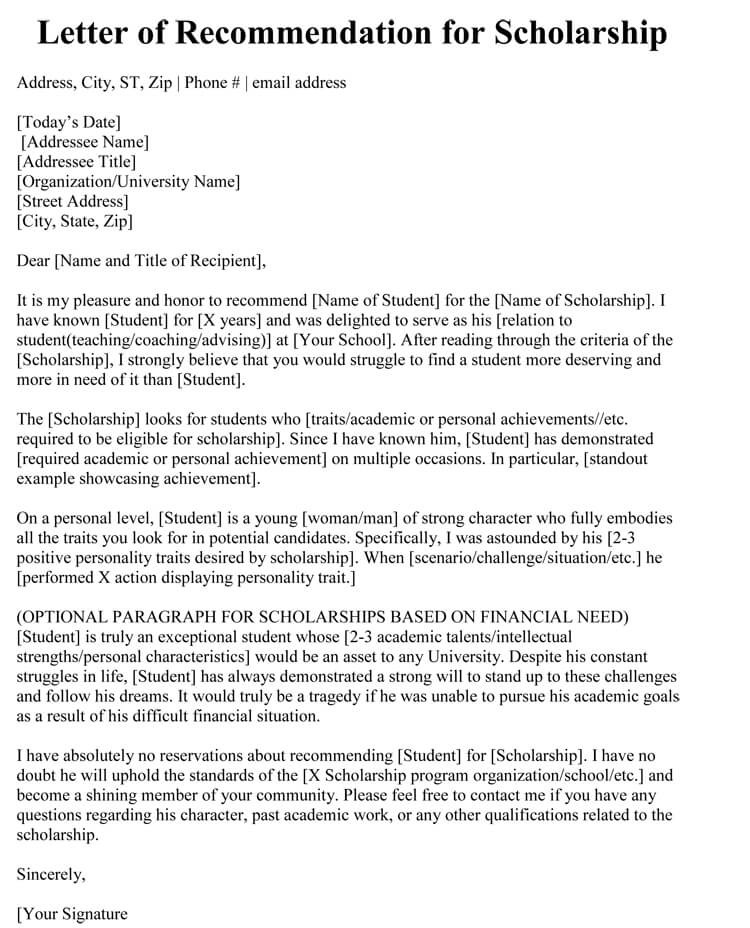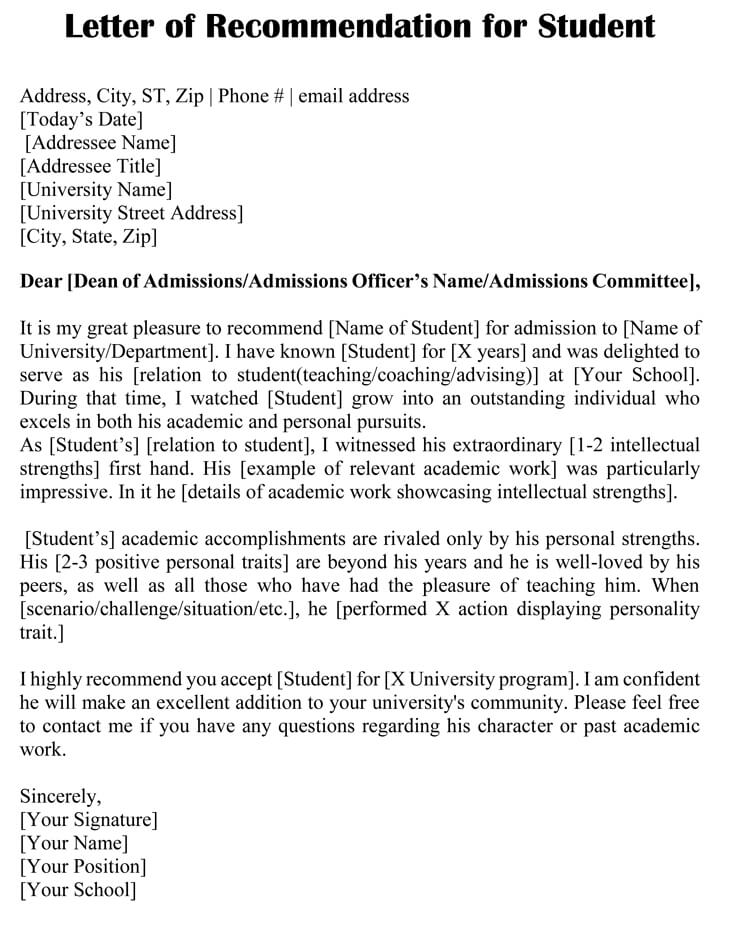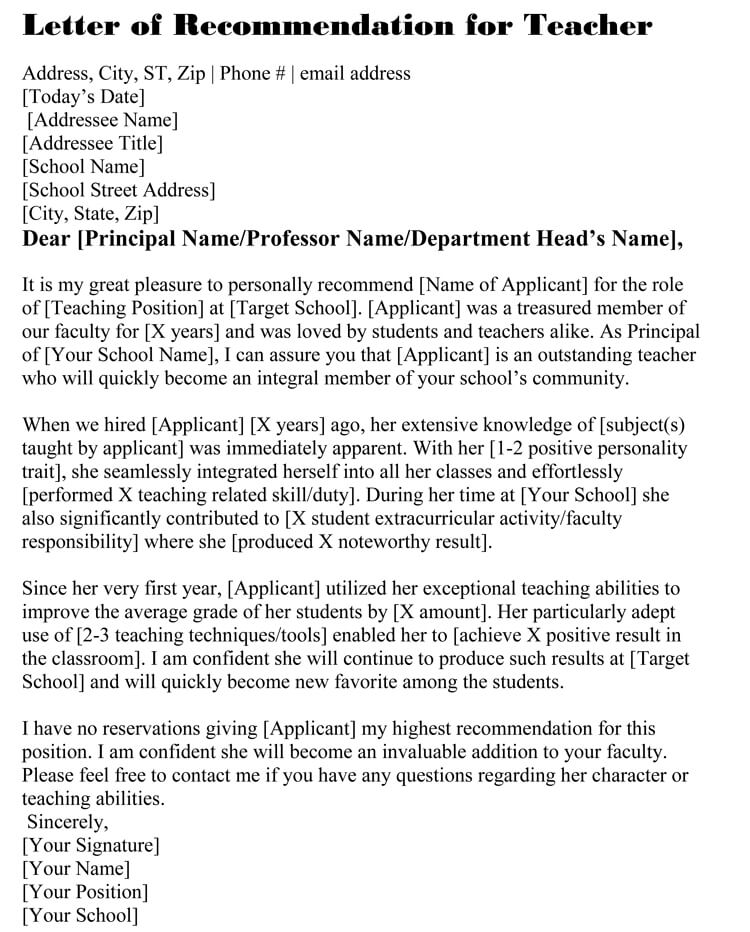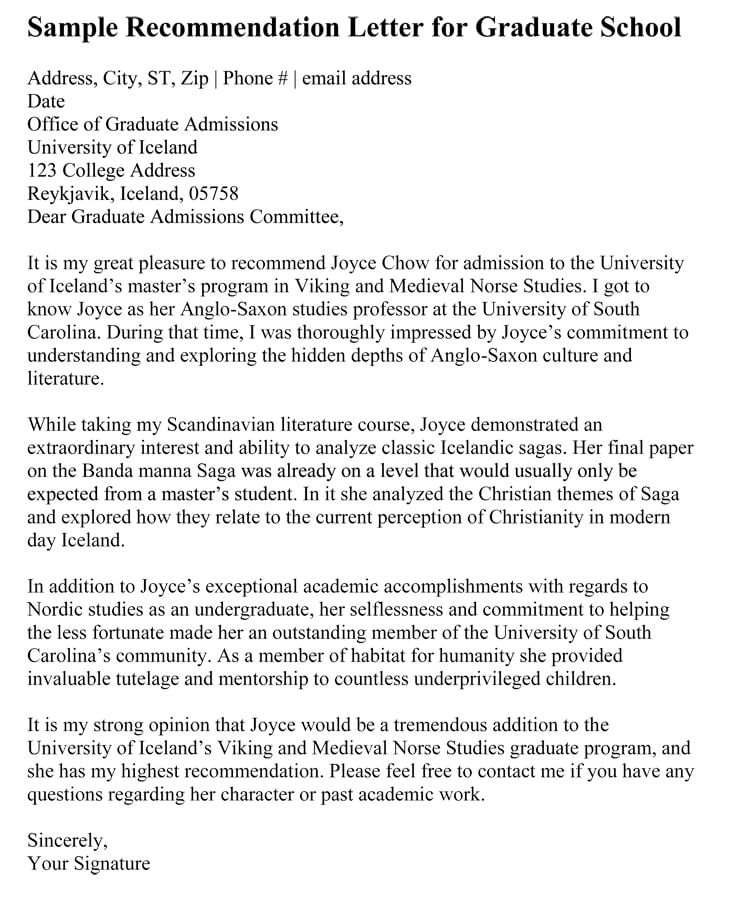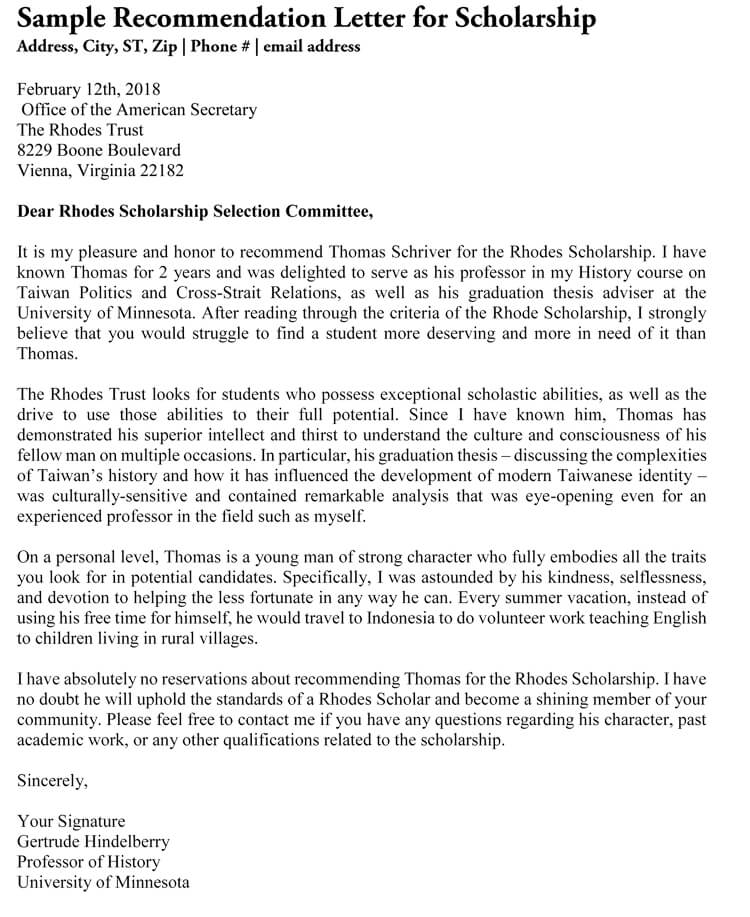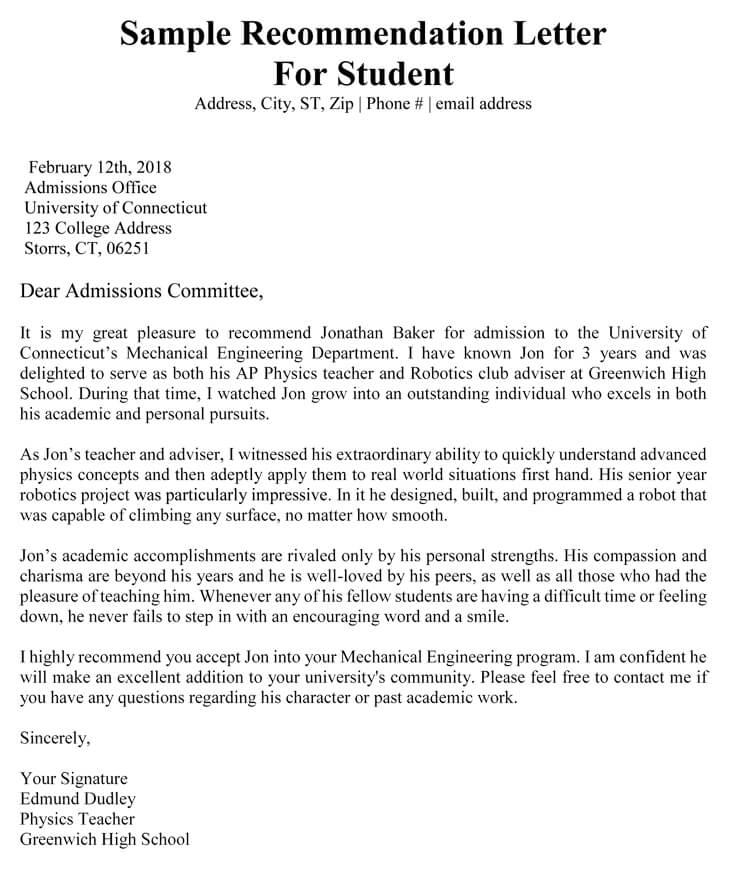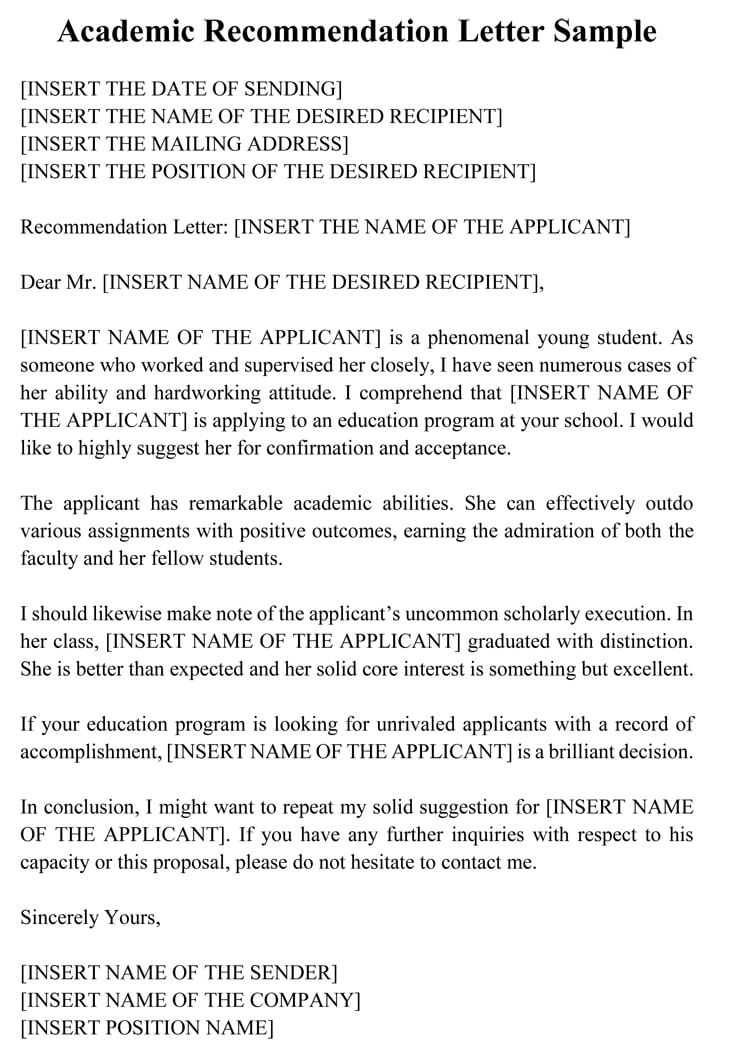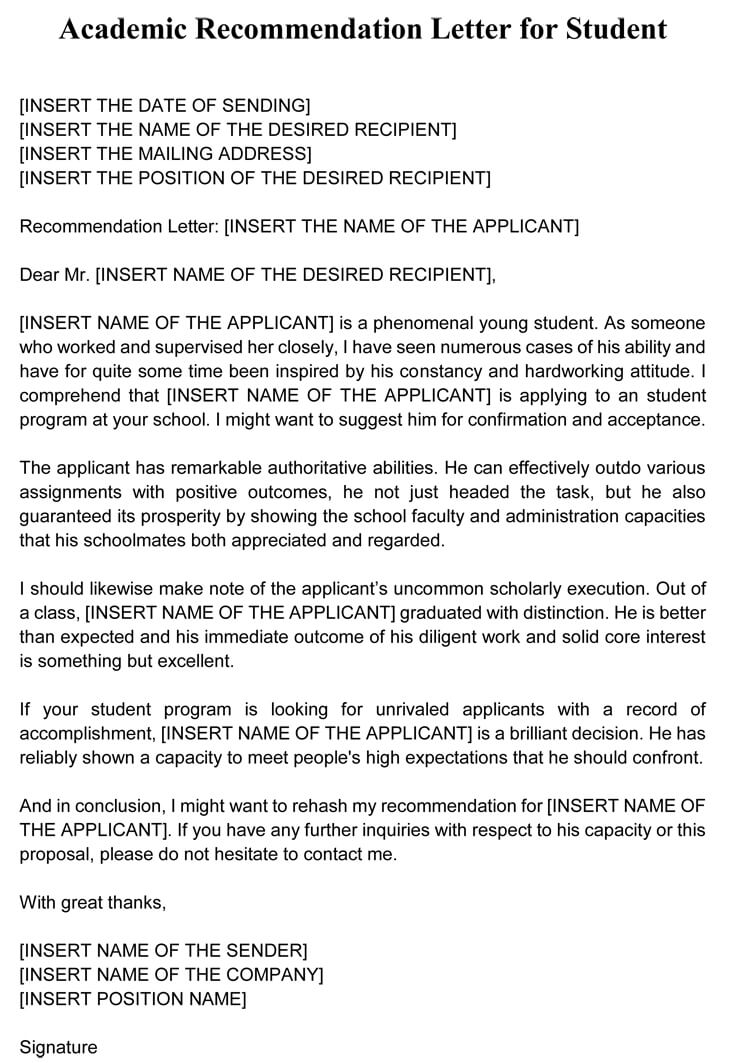An academic recommendation letter is written by a representative of the school that a recommendee attended or is still attending to inform them about the capabilities and achievements of the student. It is usually needed during job interviews, educational scholarship placements, and award recommendations to persuade interviewers’ perspectives toward the student’s application.
Its purpose is to highlight the strengths, character, interests, activities, accomplishments, and contributions of the student during their time in school to increase their chances of getting a job, promotion, or scholarship. It is written by teachers, school administrators, counselors, and coaches. It necessarily details a student’s academic results and considers their overall social aspects and character.
It is essential for providing the academic history, performance, and strengths of a student, similar to what a transcript does only with more personalization. Thus, the recommendation letter provides an organization’s applicant’s aims and extra information about their academics to complement other attached documents like a cover letter and CV.
Free Downloads
Types of Academic Recommendation Letters
Mentioned below are some types of such letters:
College recommendation letters
College recommendation letters are written to assist students in applying to college. They highlight the achievements, academic strengths, character, and contributions of the student while in high school or a former college in the case of transfers.
Graduate school recommendation letters
A graduate school recommendation letter helps employees, researchers, and undergraduates who wish to extend their education to graduate school. The academic prowess, project accomplishments, and strengths of the applicant are mentioned in the letter to show the graduate institution why they should give the student a chance to go further with their education
Job application recommendation letters
A job application recommendation letter is written to an organization or interviewer where a recommendee has applied for a job to increase their chances of getting considered. This kind of recommendation letter includes details of the strengths of the student applicant.
Letters to gain financial aid
Letters to acquire financial assistance are written to verify that a student applying for financial help is worthy of assistance from donors or scholarships to fund their studies. Financial aid is limited to students with excellent academic portfolios or who participate in curriculum activities like sports or community development; hence, a written reference from their teachers, coaches, or administration is used to verify their qualification for financial aid.
Letters to gain teaching assistant employment at a university
It is used for acquiring a teaching assistant position at a university. It highlights the student’s progress in past or present learning institutions.
Who Can Give a Recommendation Letter?
Academic faculties of the learning institution that the student attended can give this letter. Such people, mandated to write it, include:
- Teachers can write it based on their student’s academic performance, character, and particular traits since they have close interactions with them.
- Guidance counselors can also write this letter because they have most likely interacted with the student regularly to discuss their academic progress or career choices.
- Administrators, in most cases, do not mingle with the students as much as the teachers would. Still, they can also write it since they understand the student’s overall academic progress based on records and few interactions.
- Supervisors can write this letter about a student they supervised during their projects, detailing their character and abilities demonstrated during the period of their interaction.
How Do You Write an Academic Recommendation Letter?
It follows a professional and formal guideline. The letter’s writer should provide relevant details that should be included in it.
You can write it by following these steps:
Address the letter
It feels more personalized when addressed to the correct recipient; hence, the applicant should provide details of the institution, department, or individual that the letter should address.
EXAMPLE
Dear Hiring Manager,
Include a brief introduction
The introduction section of this letter should give a brief opening statement detailing the purpose of writing it on behalf of the applicant.
EXAMPLE
This letter expresses my support for Mary Anderson to gain admission into your graduate program at Harvard University in the sciences department.
Outline the applicant’s academic capabilities
This letter is bound to present the overall performance of a student in various subjects and their progress, including their strengths.
Some of the points of interest to talk about in this section include:
Extracurricular activities outside the classroom by the student should be noted in the letter to showcase their capabilities.
EXAMPLE
Sara is a talented literary critic and poet, and she has my highest recommendation as a student and writer.
Awards or recognitions
To increase an applicant’s chances of being considered, one can write about the applicant’s awards or recognitions in this letter. In addition, recommenders can mention accolades or prizes given to the student in recognition of past performance.
EXAMPLE
Sara was awarded as the best poet in the national drama festival competitions held in 2019.
Area of expertise
Disclose to the interviewer some of the areas that an applicant is best at by including them in the letter.
EXAMPLE
Sara is talented at ballet and uses it to enhance her social capabilities.
Positive character traits
When writing it, one is expected to outline the applicant’s best traits to influence a good perception of the recipient towards the applicant. Describe a candidate’s positive traits to increase their chances of being considered for a job, admission, or scholarship.
EXAMPLE
Sara is a team player and brings out the best in team members by presenting excellent team projects in all her collaborations.
Ambition
State in it the ambitions of the applicant that coincide with the job position they applied for or the study course they aim to pursue in college or graduate school.
EXAMPLE
Sara has always had the ambition to be a neurosurgeon and has purposed to advance her medical degree in the field during her graduate program.
Give an example of the applicant’s academic achievement
The strengths of the applicant should be backed by their achievements when writing this letter.
EXAMPLE
She produced an extraordinary year-long thesis paper on creative identity development. She compared works from three different periods and synthesized cultural and historical perspectives to inform her analysis
End the letter
The final part contains the writer’s closing statements that emphasize why the recipient should consider the applicant.
EXAMPLE
The applicant possesses exceptional skills, an academic portfolio, and admirable traits essential to performing job tasks. Your consideration of hiring Sara for the job position would be highly appreciated.
Provide your contact information
The writer should conclude the letter with their contact details. In most cases, one writes their official capacity contact or the institution they work for.
EXAMPLE
Tom Smith,
Principal,
Mark Twain High School.
Email: tom@marktwainschool.outlook.com
Telephone: 987-765-3738.
Template Academic Recommendation Letter
[Your Name]
[Your Position]
[Department/School]
[Institution/Organization]
[Institution/Organization Address]
[City, State, Zip Code]
[Phone Number]
[Email Address]
[Date]
[Recipient’s Name or “To Whom It May Concern” if the recipient is unknown]
[Recipient’s Position, if known]
[Recipient’s Institution/Organization, if known]
[Institution/Organization Address, if known]
[City, State, Zip Code, if known]
Dear [Recipient’s Name or “To Whom It May Concern”],
I am writing to wholeheartedly recommend [Student’s Name] for [specific program, position, opportunity, etc.] at [Institution/Organization Name, if applicable]. As [Your Position] at [Institution/Organization Name], I have had the pleasure of knowing [Student’s Name] for [length of time], during which [he/she/they] was a student in my [specific course(s)] and also engaged in [any additional academic or extracurricular activities].
Throughout this time, [Student’s Name] has consistently demonstrated exceptional qualities both academically and personally. [He/She/They] has shown a remarkable aptitude for [mention specific academic skills or subjects], evidenced by [specific achievements, projects, or academic successes]. [His/Her/Their] ability to grasp complex concepts, engage critically with material, and contribute thoughtfully to class discussions has set [him/her/them] apart.
In addition to [his/her/their] academic prowess, [Student’s Name] is [mention notable personal qualities, such as dedication, leadership, creativity, etc.]. [He/She/They] has actively contributed to [mention any relevant extracurricular activities, community service, or leadership roles], demonstrating [his/her/their] commitment to [mention relevant values or goals, such as community service, leadership, innovation, etc.]. [His/Her/Their] positive attitude, resilience, and willingness to support peers are qualities that I believe will serve [him/her/them] well in all future endeavors.
[Student’s Name]’s project on [briefly describe a significant project or research work] was a testament to [his/her/their] ability to conduct thorough research, analyze data, and present findings in a coherent and persuasive manner. This work, among others, highlights [his/her/their] potential for significant contributions to [mention field, area of study, or type of work].
I am confident that [Student’s Name] will excel in [specific program, position, or field] and bring valuable perspectives and skills to your [program/team/organization]. [He/She/They] is fully prepared to take on the challenges and opportunities that [specific program or position] offers, and I eagerly anticipate the contributions [he/she/they] will make to your academic community or professional team.
Please do not hesitate to contact me at [Your Phone Number] or [Your Email Address] should you require any further information or have any questions regarding [Student’s Name]’s candidacy. I am more than happy to provide additional insights into [his/her/their] abilities and potential.
Thank you for considering my recommendation. I am confident that [Student’s Name] will prove to be an outstanding addition to your [program, institution, or organization].
Sincerely,
[Your Signature, if sending a hard copy]
[Your Name]
[Your Position]
[Department/School]
[Institution/Organization]
Academic Recommendation Letter Sample
Sample 01
Dear Admissions Committee,
I am writing to enthusiastically recommend Maria Gonzalez for admission to the Graduate Program in Biological Sciences at Prestige University. As an Associate Professor in the Department of Biology at the University of Science City, I have had the pleasure of knowing Maria for the past three years. She was a student in my Advanced Genetics course, participated in my research lab, and completed her senior thesis under my supervision.
Throughout her time in my lab, Maria demonstrated a remarkable aptitude for scientific research. She possesses a natural curiosity and a rigorous analytical mindset, which she applied to her independent project on gene editing techniques in model organisms. Maria’s work contributed valuable insights to our ongoing research, leading to a co-authored publication in the “Journal of Experimental Biology.”
Maria’s academic record is a testament to her dedication and passion for biology. She consistently ranked at the top of her class, excelling in both coursework and laboratory work. Her ability to grasp complex concepts and engage in sophisticated discussions made her a standout student. Furthermore, Maria’s commitment extended beyond academics; she was an active member of the university’s Science Outreach Program, demonstrating her dedication to science communication and education.
What sets Maria apart is her exceptional character. She is highly motivated, dependable, and displays an impressive level of perseverance and resilience. Maria has shown leadership qualities in the lab, often mentoring undergraduate students and facilitating collaborative projects. Her positive attitude and ability to work effectively in a team have made her a valued member of our academic community.
I have no doubt that Maria will thrive in Prestige University’s Graduate Program in Biological Sciences. Her strong foundation in biology, combined with her research experience and drive for continuous learning, make her an ideal candidate for your program. Maria is poised to make significant contributions to the field, and I look forward to seeing the impact of her future work.
Please feel free to contact me if you require any further information or insights regarding Maria’s abilities and potential. I am confident that she will exceed your expectations and become an asset to your academic community.
Sincerely,
Dr. Lisa Hamilton
Sample 02
Dear Dr. Martin,
I am writing to enthusiastically recommend Dr. Emily Thompson for the position of Assistant Professor in your esteemed Department of History at Scholarly University. As the Chair of the Department of History at Prestige University, I have had the pleasure of working closely with Dr. Thompson for the past four years. During this time, she has distinguished herself as a brilliant scholar, a dedicated educator, and an invaluable colleague.
Dr. Thompson’s research on the social history of 20th-century Europe is not only groundbreaking but also a testament to her meticulous approach and innovative methodologies. Her work, particularly her recent book, “Social Echoes: The Untold Stories of 20th-Century Europe,” has received acclaim in academic circles for shedding light on previously overlooked aspects of history. Her ability to weave together complex narratives with rigorous historical analysis is truly remarkable and speaks to her potential to contribute significantly to the field.
In the classroom, Dr. Thompson is equally impressive. She possesses a natural ability to engage and inspire her students, fostering a learning environment that is both challenging and supportive. Her courses, which range from introductory surveys to advanced seminars, consistently receive outstanding evaluations from students. Dr. Thompson’s commitment to pedagogical excellence extends beyond her classes; she has been instrumental in revamping our department’s curriculum to better reflect the diversity and complexity of history as a discipline.
Furthermore, Dr. Thompson is a collaborative and supportive colleague who has contributed immensely to our department’s collegial atmosphere. She has served on several committees, where her insights and dedication have been invaluable in advancing our department’s goals, particularly in the areas of diversity and inclusion.
I am confident that Dr. Thompson will be an outstanding addition to your faculty at Scholarly University. Her scholarly expertise, pedagogical skill, and collegiality will undoubtedly enrich your department and the wider university community.
Please feel free to contact me at henry.walton@prestigeu.edu or (617) 555-0101 if you require further information or wish to discuss Dr. Thompson’s qualifications in more detail. I am eager to see the contributions she will make to the field of history and to the academic community at Scholarly University.
Sincerely,
Dr. Henry Walton
Chair, Department of History
Prestige University
Analysis
Both recommendation letters effectively advocate for the candidates, offering comprehensive assessments of their qualifications and suitability for the positions. The first sample emphasizes academic excellence, research contributions, and exemplary character traits, portraying the candidate as well-prepared for the Graduate Program in Biological Sciences. The letter provides specific examples and demonstrates the writer’s confidence in the candidate’s future success. Similarly, the second sample highlights scholarly achievements, teaching effectiveness, and collaborative spirit within the academic community, presenting the candidate as a valuable addition to the department. The endorsement from a respected figure in the field lends credibility to the recommendation. Both letters offer insights into the candidates’ professional and personal attributes, instilling confidence in their ability to excel in their respective roles. Overall, these well-crafted letters effectively communicate the candidates’ strengths and suitability for admission/employment, providing compelling endorsements likely to resonate with the recipients.
Tips for Writing a Great Recommendation Letter
If one is requested to write it, it is necessary to consider the following tips:
Think before accepting a request
One should assess the adequacy of their knowledge of the applicant who approaches them to write an academic recommendation before accepting the request. In addition, the teacher or academic official should check if they have spare time to write and submit the letter on time to the recipient before accepting the request to write it.
Focus on a particular school/job
Great recommendation letters are filled with content that focuses primarily on the specific school, course, or position that is being applied for. Unfortunately, the deviation may make the letter seem wordy or unnecessary and may even diminish the application’s chances of acceptance.
Gather information
It is the writer’s responsibility to gather as much information about the student as possible. Having an adequate database of information will enable to give a comprehensive review in the recommendation letter.
Include examples
A great recommendation letter must also make good use of models. Having standards makes the message stick and relate to the reader.
Keep a positive tone
It is also essential to keep a positive manner throughout the letter. Having a positive tone will also enable the writer to give a comprehensive review of the letter.
Provide contact information
The other part of the letter that is quite important is the contact details segment. It is the last part, and one must use his official contact or the official contact of the institution.
Follow the submission guidelines
A recommender has to follow the submission guidelines, such as submission deadlines as required by the institution being applied to by the applicant. The institution may require one to use a particular mode of communication
EXAMPLE
The recipient may require the letter to be sent via email.
Conclusion
This letter is vital for portraying the positive attributes of an applicant to help improve their chances of getting a job or acquiring school/college admission. The letter should be written formally, and writers can rely on a template to assist them in writing.
